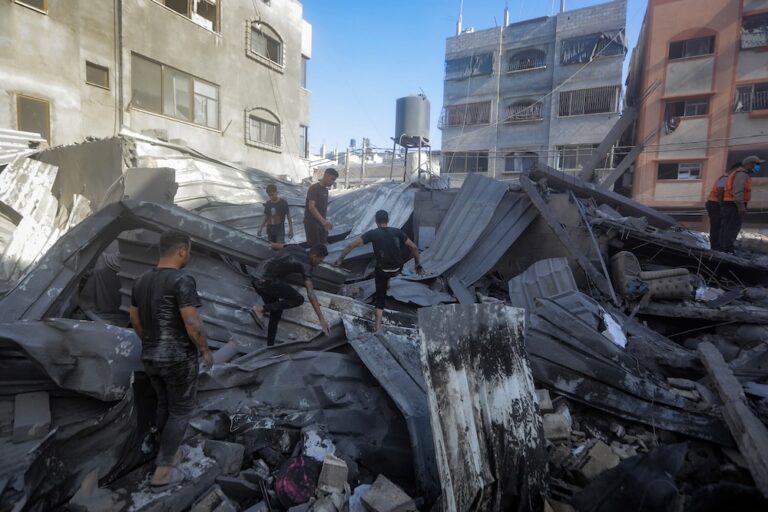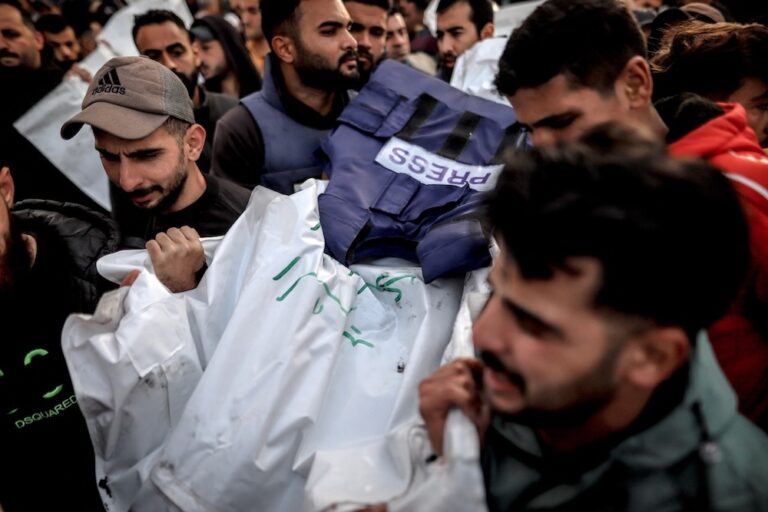(RSF/IFEX) – In response to a call from RSF, around 50 journalists and photographers gathered this morning outside the headquarters of the French news agency Agence France-Presse in Paris in a show of solidarity with Jaime Razuri, the AFP photographer of Peruvian nationality who was kidnapped in Gaza City on 1 January 2007 (see IFEX […]
(RSF/IFEX) – In response to a call from RSF, around 50 journalists and photographers gathered this morning outside the headquarters of the French news agency Agence France-Presse in Paris in a show of solidarity with Jaime Razuri, the AFP photographer of Peruvian nationality who was kidnapped in Gaza City on 1 January 2007 (see IFEX alerts of 4 and 2 January 2007). The photographers laid their cameras on the ground and brandished large photos of Razuri.
“Five days have gone by since Jaime was kidnapped and there is still no information about the affiliation of his kidnappers,” AFP news director Denis Hiault told the gathering. “A lot of contacts are being conducted with local officials and institutions in an effort to discover their identity. All shows of support are welcome in order to put pressure on them and to obtain his release as soon as possible. He was in a complicated region to cover the situation of the Palestinians.”
RSF secretary-general Robert Ménard insisted on the need for action and demonstrations. “Generally, the kidnappings of journalists in the Gaza Strip do not last more than 48 hours,” Ménard said. “But we must be aware that things could get out of control. The entire news media are now threatened with the possibility of no longer being able to work in the Palestinian territories. This concerns us all.”
When the news of Rázuri’s abduction broke, RSF contacted all of the Palestinian factions to make sure of their support in this case. An appeal by Razuri’s mother, Denia Razuri, was also broadcast on the pan-Arab satellite TV station Al-Jazeera. “I call on God to protect Jaime and give him courage [. . .] If his kidnappers hear me, I beg them to free my son,” she said.
Dimitri de Kochko of the French journalists’ union SNJ-CGT also appealed to the Palestinian factions to ensure that journalists are able to continue reporting in the region. “New coverage is useful for them as well,” he said. “We call for an end to hostage-taking.”
Four gunmen kidnapped Razuri on the afternoon of 1 January as he was returning to the AFP bureau in Gaza City in the company of a driver and an interpreter.
Palestinian journalist Fady Al-Aroury, who works for the privately-owned local news agency Maan and the daily newspaper “Al Ayyam”, was meanwhile wounded by Israeli gunfire on 4 January during an Israeli military incursion into the West Bank city of Ramallah. Aroury was shot in the abdomen but his injuries were reportedly not considered life-threatening.
In addition, the premises of the state-owned news agency WAFA in the West Bank city of Nablus were stormed on 4 January by gunmen, who destroyed computer equipment before fleeing. A WAFA journalist, Mahmoud Makhlouf, said the assailants were apparently critical of the agency for focusing its coverage on the activities of President Mahmoud Abbas’s party, Fatah, at the expense of other factions.
These incidents are perfect examples of the two-fold dangers to which journalists are exposed in the Palestinian territories. An RSF delegation visited Israel and the Gaza Strip from 3 to 7 December 2006 to meet with the authorities and discuss the plight of journalists, who are exposed to both Israeli gunfire and violence between the various Palestinian factions. RSF has published a report on this visit that includes recommendations for improving the security of journalists.


